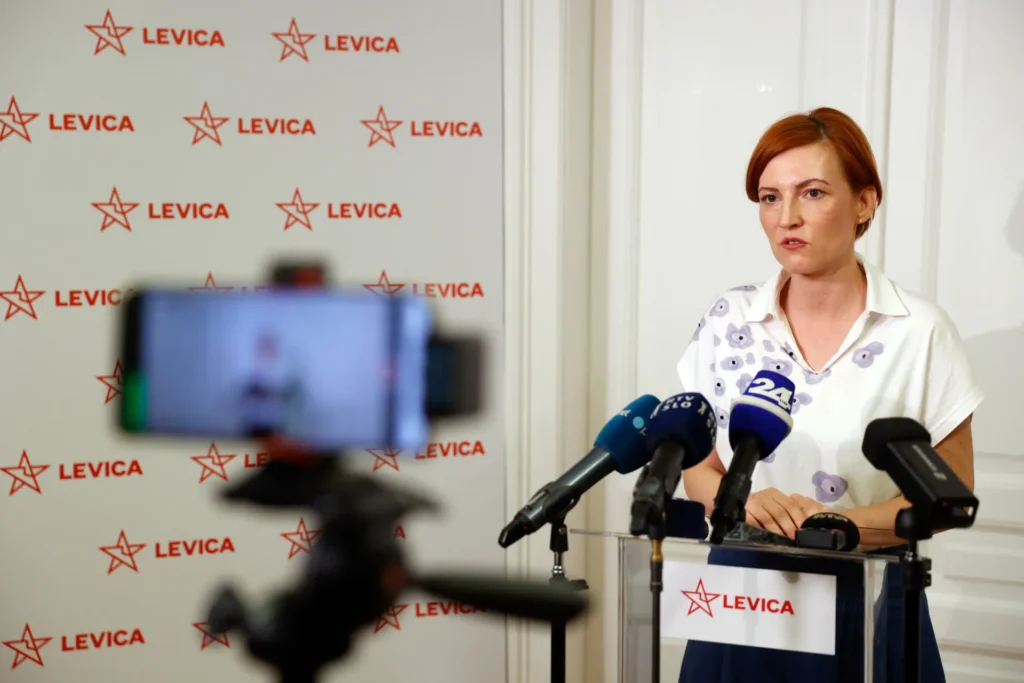Political analyst Dr Matevž Tomšič sees the outcome of the referendum, in which voters overwhelmingly rejected the law on the supplement to artists’ pensions, as a blow to the ruling coalition. As the Left (Levica) and Freedom Movement (Gibanje Svoboda) parties had called for a boycott of the referendum beforehand, he pointed out that this has actually come back to bite them like a boomerang.
On Sunday, the 11th of May, voters had the opportunity to decide on the enactment of the law on the pension supplement for outstanding achievements in the arts. In order for the law to be rejected, a majority of voters had to vote against it, and at least one-fifth of the total electorate, or 338,491 voters, had to come to the polls. The rejection quorum was reached, as more than 400,000 people voted against privileges for the few.
Leader of the Slovenian Democratic Party (Slovenska demokratska stranka – SDS), Janez Janša, said that Slovenia had taken a big step towards taking back the country that had been stolen from us. “The government coalition got two slaps on the wrist in a vote of the people who take the Slovenian Constitution seriously. First, because a bad, shameful law was rejected, which sought to grant unjustified privileges to a few. The second, even bigger slap was given to the representatives of the executive who called on voters to boycott the referendum,” he made it clear, adding that any government would have resigned after such a double slap on the wrist. In his view, it is up to the Slovenian electorate to “respond to such a reaction or non-reaction at the next elections, which in any case will happen within a year.”
“What a slap in the face of this arrogant government. Despite all the calls to boycott democracy … despite the ignoring of the mainstream media … despite the sleepy people …,” commented Sebastjan Jeretič, a political analyst and an expert on communication in politics, on the social network X. Both Professor Dr Boštjan M. Turk and journalist Bojan Požar are convinced that the resignation of Culture Minister Asta Vrečko should now follow. Her resignation is also expected in the New Slovenia party (Nova Slovenija – NSi).
We spoke to political analyst and professor Dr Matevž Tomšič about the referendum result. He told us that it was expected that the vast majority of participants would express their opposition to the law. This was the case, he said, because the largest government party and many opinion leaders on the left were calling for a boycott of the vote. This, however, proved to be counterproductive. He stressed that a referendum is a form of democratic expression of the will of the electorate and, after all, the left-wing coalition is also very keen to emphasise the importance of citizens’ participation in political decision-making, participation, activism, etc., but they were calling for a boycott anyway. “In fact, it has come back to them like a boomerang. By calling for a boycott, they have also exempted themselves from the campaign itself,” he said, adding that one would expect the government, or the largest party in government, to argue in favour of the law it has passed. That is, to try to convince people that the law is something good, something positive. “The result of the referendum is, after all, a direct consequence of this.”

Calls for a boycott, he said, had led to only one side leading the substantive campaign. “But what we heard from the supporters of the law was just a bit of a rant about how the electorate is being given nothing to vote for. We could also hear primitive statements by some supposedly prominent cultural figures, such as Svetlana Makarovič, who said that the SDS party was made up of primitive people,” he pointed out, adding that this was not the best way to persuade voters to support your solution or, in this particular case, to persuade them to vote in favour of the law.
He went on to say that a victory for the non-implementation of the law was a blow for the ruling coalition, at least in terms of some prestige. “This, in itself, of course, does not bring much. But it is undoubtedly a message from the electorate. After all, I dare say that many people went to the referendum and voted against the law only to teach the government a lesson, to express their dissatisfaction with the government,” he stressed, adding that the content itself was of secondary importance. “Ultimately, this was more about deciding whether or not to support the government. Speaking from the perspective of the next parliamentary elections, there is nothing to suggest that this is the reason why the SDS party would now win the elections. For the party that proposed the referendum, this can undoubtedly have a very positive effect on their self-confidence in terms of ultimately boosting the morale of their members and voters,” he concluded.
“Golob should dismiss Minister Vrečko as soon as possible, and put most of the blame for the fiasco on the Left party and kick it out of the coalition,” political scientist Dr Miro Haček pointed out in a response on the social network X. “By doing so, he would have positioned himself and the Freedom Movement party more towards the centre, made Prebilič and Logar’s job more difficult (and take even more votes away from the Social Democrats – SD), shown himself as a strong and decisive leader, taken all the media attention for the referendum victory away from the SDS party, and also saved the ass of the Left party, which could have gone into opposition and played the victim until the next elections, which it would have then managed to survive politically. What do you think of this political strategy?” he added.
“Robert, Klakočar Zupančič and their partners … in the coming months, live out some more “childhood dreams”, and then good luck and never again! Asta Vrečko and the team of the ideology of madness …… Continue to fill your pockets until the end of the “dance”, then good luck and never again!” political analyst Miran Videtič pointed out on Facebook, referring to the message of the referendum.
Ž. N


